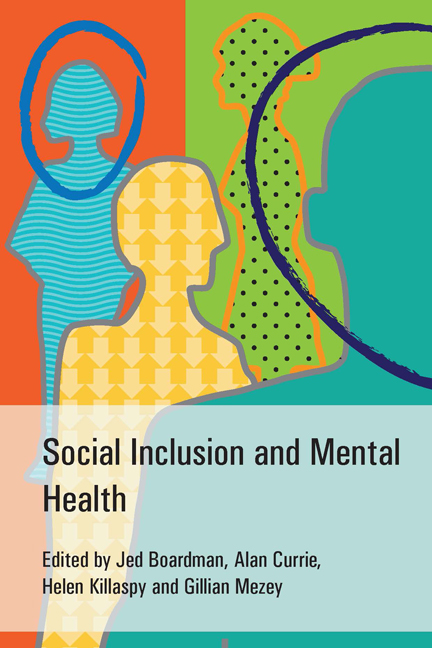Book contents
- Frontmatter
- Contents
- List of contributors
- List of tables
- Foreword
- Preface
- Acknowledgements
- Scoping Group on Social Inclusion, Royal College of Psychiatrists
- Part 1 What is social exclusion?
- Part 2 Social exclusion: the scope of the problem
- Part 3 Working towards inclusive psychiatry
- 13 Social inclusion: research and evidence-based practice
- 14 Implications of social inclusion for individual practice
- 15 Socially inclusive mental health services: what will they look like?
- 16 Training for socially inclusive practice
- 17 Community mental health and the inclusion–exclusion seesaw
- 18 Socially inclusive practice and psychiatry in the 21st century
- Index
13 - Social inclusion: research and evidence-based practice
from Part 3 - Working towards inclusive psychiatry
- Frontmatter
- Contents
- List of contributors
- List of tables
- Foreword
- Preface
- Acknowledgements
- Scoping Group on Social Inclusion, Royal College of Psychiatrists
- Part 1 What is social exclusion?
- Part 2 Social exclusion: the scope of the problem
- Part 3 Working towards inclusive psychiatry
- 13 Social inclusion: research and evidence-based practice
- 14 Implications of social inclusion for individual practice
- 15 Socially inclusive mental health services: what will they look like?
- 16 Training for socially inclusive practice
- 17 Community mental health and the inclusion–exclusion seesaw
- 18 Socially inclusive practice and psychiatry in the 21st century
- Index
Summary
As we have seen in earlier chapters, social inclusion is a complex concept which overlaps with several other important ideas in social and community psychiatry and which has potentially wide applicability to a range of individuals and groups.
In this chapter we will discuss some of the key methodological issues and research outcomes relating to research in social exclusion and mental ill health. Throughout, we will be concerned with research that addresses both social exclusion and mental illness, not with either alone, although they are clearly related. Given the breadth of this field, our review will be selective, aiming to give a general overview of the literature, rather than a comprehensive account.
Measurement
Conceptual and methodological issues
Measures of social inclusion fall into two broad categories, individual level and societal level (Berman & Phillips, 2000):
1 individual-level measures reflect the situation and life experience of people belonging to socially excluded groups (in this case people with mental health problems); they are usually of more interest to mental health practitioners and clinically-oriented researchers
2 societal-level measures, also sometimes referred to as a ‘social indicators’ approach, rely on existing data sources that characterise levels of participation in larger community samples – examples of this are employment rates as assessed in the annual Labour Force Survey (Department for Work and Pensions, 2007) and the number of rough sleepers as calculated by local authorities (Palmer et al, 2007); this approach tends to be of more interest to planners, politicians and social policy-makers.
Notwithstanding the importance of reliability, any measurement tool for social inclusion must also have validity. Thus, it must ‘converge’ with other instruments measuring similar concepts, such as poverty, citizenship, social capital, ‘quality of life’. However, it must also ‘diverge’ (discriminate) between social inclusion and these related concepts. For example, social inclusion combines aspects of poverty (e.g. income, welfare benefits, exclusion from the labour market) but also elements of social participation. Similarly, it includes aspects of social capital (e.g. membership of social networks, community groups and civic participation) but adds in poverty and stigma and discrimination. It also overlaps with quality of life measures in terms of both objective and subjective indicators. Any comprehensive measure of social inclusion must therefore meet these challenges to content and discriminant validity.
- Type
- Chapter
- Information
- Social Inclusion and Mental Health , pp. 279 - 294Publisher: Royal College of PsychiatristsFirst published in: 2017



